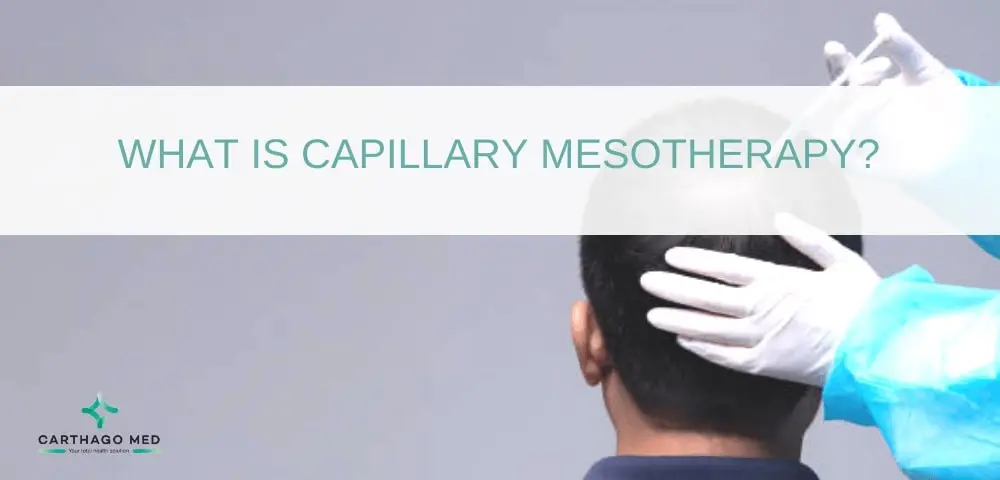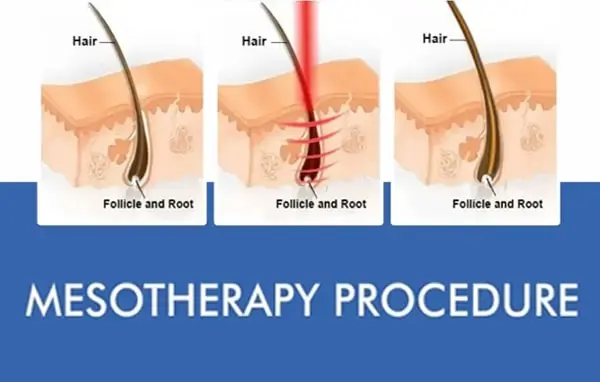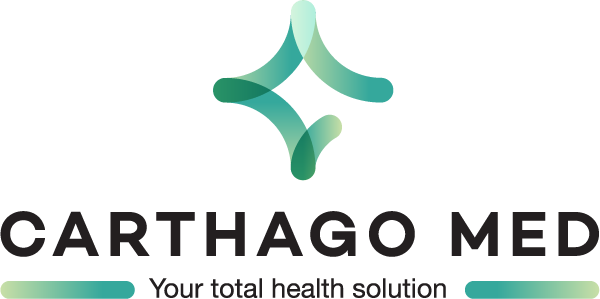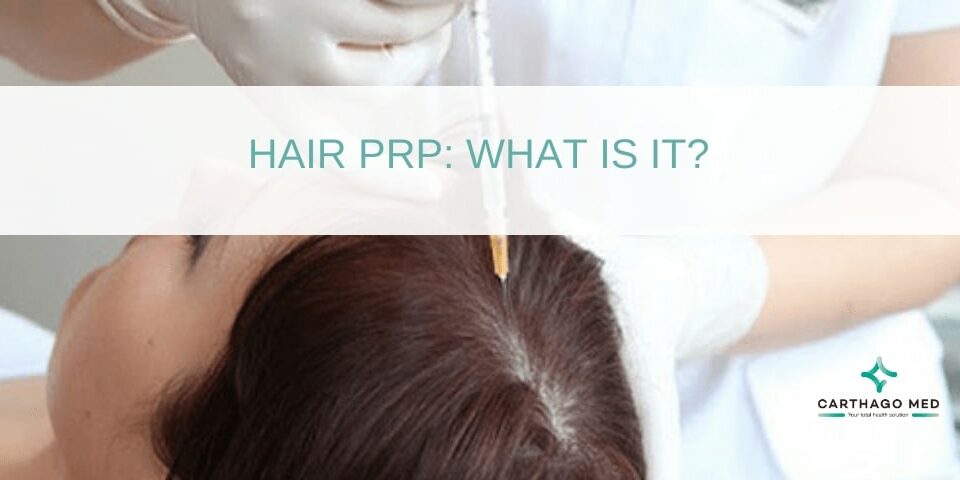
What is capillary Mesotherapy?
Hair mesotherapy is a biostimulation treatment that biologically activates hair cells through small, painless subcutaneous injections. Mesotherapy reverses the miniaturisation of the follicle and increases hair thickness and growth. Mesotherapy treatments are used to treat various conditions. In addition to being very effective in treating hair loss, they are widely used in beauty treatments.
For a long time, and especially in recent years, people all over the world have been working tirelessly to try to find the best method to recover lost hair. After many tests and trials with different procedures, they have concluded that the safest and fastest way to recover lost hair is hair transplantation, the effects of which are enhanced by mesotherapy. Hair mesotherapy is considered by specialists to be a very effective technique, which regenerates the epidermis and activates the blood circulation in the area where it is applied.
What does hair mesotherapy contain?
Hair mesotherapy is a treatment that involves injecting a specially formulated solution into the scalp to promote hair growth and improve hair health. The solution typically contains a combination of vitamins, minerals, amino acids, and other nutrients that are essential for healthy hair follicles. These ingredients work together to nourish the scalp, strengthen the hair shaft, and stimulate circulation, which can help to revive dormant hair follicles and encourage the growth of new, thicker hair. Additionally, some mesotherapy solutions may also contain medications such as minoxidil, which is known to help prevent hair loss and promote regrowth. Overall, the precise ingredients in a hair mesotherapy solution may vary depending on the specific needs of the individual and the goals of the treatment, but they are generally designed to provide comprehensive support for optimal hair health and growth.
What are the objectives of capillary mesotherapy?
The aim of hair mesotherapy varies based on the underlying cause of alopecia or hair loss. Typically, it encompasses multiple goals to comprehensively address the issue. Firstly, the treatment seeks to mitigate hair loss by employing targeted techniques to halt the shedding process. Concurrently, it endeavors to foster regrowth by activating the dormant or hypoactive follicles through stimulation, thereby rejuvenating their activity. Moreover, the therapy aims to fortify the existing hair strands by infusing them with essential trace elements and nutrients crucial for their vitality and resilience. By amalgamating these objectives, hair mesotherapy endeavors to provide a holistic approach to combatting alopecia and promoting healthy hair growth.
Cases in which it is recommended to use capillary mesotherapy
Androgenic alopecia :
L’alopécie androgénique, également connue sous le nom de calvitie masculine ou féminine, est l’une des principales causes de perte de cheveux chez les hommes et les femmes. Cette condition est généralement héritée et est causée par des hormones appelées androgènes, qui peuvent entraîner un rétrécissement des follicules pileux et une diminution de la croissance des cheveux. Les hommes atteints d’alopécie androgénique présentent souvent une récession de la ligne des cheveux et une calvitie au sommet du crâne, tandis que les femmes peuvent développer un éclaircissement diffus sur le dessus de la tête. Bien qu’il n’existe pas de remède définitif pour l’alopécie androgénique, il existe plusieurs options de traitement disponibles pour ralentir la progression de la perte de cheveux et favoriser la repousse des cheveux, y compris la mésothérapie capillaire, les médicaments topiques comme le minoxidil et les traitements au laser.
Patients with moderate hair loss :
Les patients présentant une perte de cheveux modérée peuvent bénéficier de diverses options de traitement pour restaurer la densité et la plénitude de leurs cheveux. La mésothérapie capillaire est l’une de ces options, car elle permet d’administrer directement des nutriments essentiels au cuir chevelu, stimulant ainsi la croissance des cheveux et renforçant les follicules pileux. En plus de la mésothérapie, d’autres traitements tels que le PRP (plasma riche en plaquettes), les traitements au laser et les médicaments topiques comme le minoxidil peuvent également être recommandés en fonction des besoins individuels du patient. Il est important que les patients atteints de perte de cheveux modérée consultent un professionnel de la santé capillaire qualifié pour obtenir un diagnostic précis et des recommandations de traitement personnalisées afin de restaurer efficacement la densité de leurs cheveux et de retrouver leur confiance en eux.
Hair that has lost quality :
Les cheveux qui ont perdu en qualité, devenant ternes, cassants ou sujets à la casse, peuvent bénéficier de traitements visant à restaurer leur vitalité et leur force. La mésothérapie capillaire est une option populaire pour améliorer la qualité des cheveux, car elle fournit une injection directe de nutriments essentiels comme les vitamines, les minéraux et les acides aminés directement au niveau du cuir chevelu. Ces nutriments nourrissent les follicules pileux, renforcent la tige capillaire et stimulent la croissance de nouveaux cheveux plus sains. En plus de la mésothérapie, d’autres traitements tels que les masques capillaires nourrissants, les suppléments nutritionnels et les produits capillaires de qualité peuvent être recommandés pour maintenir et améliorer la santé des cheveux au fil du temps. En adoptant une approche holistique de la prise en charge des cheveux, il est possible de restaurer leur qualité et de retrouver des cheveux plus forts, plus brillants et plus résistants.
What is the hair mesotherapy technique?
WHO IS THE HAIR MESOTHERAPY PROCEDURE SUITABLE FOR?
Mesotherapy for hair is suitable for both men and women, although we must bear in mind that not everyone can undergo treatment with this technique. Therefore, mesotherapy will not be applicable to pregnant women, nursing mothers, minors, during chemotherapy treatment, diabetics, patients suffering from heart, kidney or liver failure.
HOW DOES A CAPILLARY MESOTHERAPY SESSION TAKE PLACE?
During a hair mesotherapy session, the skin must be clean and dry and, although it is not an invasive or painful technique, in some cases an anaesthetic gel may be applied to numb the area and minimise discomfort from the puncture. The doctor begins by injecting the areas of alopecia or where the patient wishes to stimulate hair growth. The injections are quick, multiple, with very small and thin needles, shallow and with a distance of about 2 centimetres between each one. The number of injections depends on the condition of the patient’s scalp and hair. The duration of the sessions is between 15 and 30 minutes. The number of sessions and their frequency depend on the specific case. The results will start to show after the fourth session.
AFTER THE MESOTHERAPY SESSION
After the mesotherapy session, it is not advisable to go to moist places. In this sense, saunas, spas, swimming pools, etc. should be avoided. It is also advisable to use a sunscreen (factor 50, hat or hood). Furthermore, after a session of hair mesotherapy, it takes 48 hours for the microperforations to heal completely. During these two days, you must be very careful.
To maintain healthy hair and scalp, it’s advisable to avoid several practices. Firstly, refrain from shampooing your hair excessively, particularly with harsh products that can strip away natural oils and irritate the scalp. Avoid exposing your hair to chlorine in swimming pools, excessive heat in saunas or solariums, as well as the saltwater of lakes or seas, which can all cause damage.
Limit strenuous physical activity, as excessive sweating can lead to scalp irritation. Additionally, opt for loose-fitting hats to avoid restricting blood flow to the scalp. Avoid aggressive actions like massaging the head and neck too vigorously, which can exacerbate scalp issues. Minimize the use of hairdryers and hairdressing products containing harsh chemicals that can dry out the hair and scalp. Refrain from frequent hair dyeing or shaving, as these processes can weaken the hair follicles. Furthermore, limit alcohol consumption, as it can dehydrate the body, including the scalp. Lastly, resist the urge to touch or scratch your head excessively, as this can worsen existing conditions and lead to scab formation. Taking these precautions can help maintain the health and vitality of your hair and scalp.

What are the contraindications to hair mesotherapy treatment?
Hair mesotherapy is a comprehensive and intensive treatment for hair loss that targets the scalp with a variety of substances. This therapy involves some of these substances entering the bloodstream, which consequently leads to certain contraindications. Notably, hair mesotherapy is strictly prohibited during pregnancy and breastfeeding, as well as in cases of oncological and autoimmune diseases, acute inflammatory processes, and viral or fungal scalp infections. Patients with haemophilia or other blood disorders, exacerbations of chronic visceral conditions, or weakened immune systems should also avoid this treatment. Furthermore, it is not recommended for minors or individuals over 60 years old. Additionally, it’s crucial to allow a minimum of two weeks to pass after recovering from illnesses like colds or viral infections before undergoing hair mesotherapy, allowing the body sufficient time to recuperate.
The advantages and disadvantages of mesotherapy
Hair mesotherapy presents a highly effective option for addressing hair loss and baldness, boasting several advantages over alternative procedures. Firstly, it entails few contraindications and is a minimally invasive procedure, minimizing the risk associated with more invasive treatments. Additionally, there’s no need for a subsequent rehabilitation period, allowing individuals to resume their daily activities promptly. Moreover, it yields highly effective results and exerts a positive impact on the skin, enhancing overall scalp health.
However, like any medical intervention, hair mesotherapy also carries certain drawbacks. For instance, achieving significant results typically requires undergoing 5 to 15 sessions, necessitating a commitment of time and resources. While the procedure itself is generally not painful, some individuals may experience unpleasant sensations during treatment.
Furthermore, similar to other non-surgical approaches for hair loss, the primary limitation of hair mesotherapy lies in its temporary nature. Continuous treatment is essential to maintain results, as the genetic factors underlying hair loss remain unaffected. Consequently, hair mesotherapy offers a less permanent solution compared to surgical interventions like hair transplants. Nevertheless, it remains a viable choice for those seeking to augment their hair density within a shorter timeframe without resorting to surgery.









